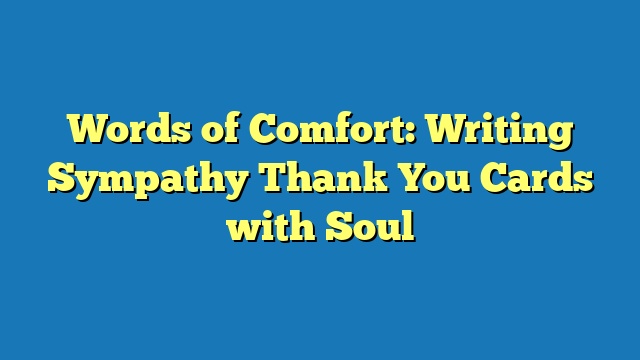When Loved Ones Mourn: The Importance of Sympathy Thank You Cards
Sympathy thank you cards with messages inside are heartfelt expressions of gratitude sent to those who have offered condolences during a time of loss. Example: “Your kind words and support during this difficult time have brought us comfort. Thank you so much for your thoughtfulness.”
These cards are not just polite gestures; they play a vital role in the grieving process, allowing the bereaved to feel supported and appreciated while providing closure and a sense of resolution. Historically, sending sympathy cards has been a tradition for centuries, with roots in ancient cultures where offering condolences was considered a sacred duty.
In this article, we will explore the profound impact of sympathy thank you cards, their benefits, and how they have evolved over time. We will also provide practical tips on choosing the right words to convey your heartfelt gratitude.
Sympathy Thank You Cards with Message Inside
Sympathy thank you cards with messages inside are profound expressions of gratitude that serve multiple important purposes during a time of grief.
- Empathy: Acknowledge the pain and loss experienced.
- Support: Offer emotional comfort and reassurance.
- Gratitude: Express sincere appreciation for condolences.
- Connection: Maintain a bond despite physical distance.
- Healing: Contribute to the grieving process and emotional well-being.
- Respect: Honor the memory of the deceased.
- Tradition: Uphold a meaningful custom of offering sympathy.
- Closure: Provide a sense of finality and resolution.
These aspects are deeply intertwined, shaping the significance of sympathy thank you cards. They not only convey gratitude but also extend emotional support, strengthen connections, and facilitate the healing process for those who have lost a loved one.
Empathy
Sympathy thank you cards offer a unique opportunity to express heartfelt empathy, acknowledging the profound pain and loss experienced by those who are grieving.
- Validation of emotions: Sympathy cards validate the bereaved’s feelings, letting them know that their pain is recognized and understood.
- Understanding: Empathy involves understanding the unique circumstances of each loss, acknowledging the individual’s relationship with the deceased and the impact of their absence.
- Shared sorrow: Sending a sympathy card conveys that the sender shares in the sorrow of the bereaved, offering a sense of community and support.
- Respect for the grieving process: Empathy recognizes that grief is a personal and nonlinear journey, and that there is no right or wrong way to feel.
Empathy serves as the foundation for meaningful sympathy messages. By acknowledging the pain and loss experienced, sympathy thank you cards offer a beacon of comfort and support during a difficult time.
Support
Sympathy thank you cards with messages inside are conduits of emotional support, offering comfort and reassurance to those grieving the loss of a loved one. The messages within these cards serve as a lifeline, providing solace and strength during a difficult time.
Emotional support is a cornerstone of sympathy thank you cards. The words convey empathy, understanding, and a caring presence, even from afar. They acknowledge the pain and loss experienced by the bereaved, offering a sense of shared sorrow and community. By expressing genuine concern and support, these cards help alleviate feelings of isolation and loneliness that often accompany grief.
Real-life examples abound: A message that reads, “Your presence at the funeral and the kind words you shared brought me much comfort,” illustrates how emotional support can be conveyed through sympathy cards. Another example: “Your sympathy card reminded me that I’m not alone in my grief, and that has given me strength to face each day.” Such messages provide tangible evidence of support, offering a beacon of hope amidst the darkness of loss.
The practical significance of emotional support in sympathy thank you cards cannot be overstated. It helps bereaved individuals feel understood, valued, and less alone. It fosters a sense of connection and belonging, promoting emotional resilience and well-being during the grieving process.
Gratitude
Sympathy thank you cards with heartfelt messages serve as tangible expressions of gratitude, offering a meaningful way to acknowledge the kindness and support received during a time of loss. These messages go beyond mere acknowledgment; they convey genuine appreciation for the comfort and solace provided by those who care.
Gratitude is an essential component of sympathy thank you cards. It recognizes the empathy, understanding, and practical help extended by others during a difficult time. Expressing sincere appreciation not only shows good manners but also fosters a sense of connection and community. Real-life examples abound: “Your thoughtful words and presence at the memorial service meant the world to me” or “Your generous donation to the charity in my loved one’s memory is a touching tribute.” Such messages demonstrate how gratitude finds expression through sympathy thank you cards.
The practical significance of gratitude in sympathy thank you cards cannot be overstated. It strengthens the bonds between individuals, promotes emotional well-being, and fosters a sense of hope and resilience. By acknowledging the support received, gratitude helps the bereaved feel valued and less alone in their grief. It also encourages continued support and compassion, creating a virtuous cycle of care and understanding.
In conclusion, the connection between gratitude and sympathy thank you cards is profound and multifaceted. Gratitude serves as the driving force behind these heartfelt messages, transforming them from simple acknowledgments into expressions of deep appreciation and connection. By recognizing the significance of gratitude in sympathy thank you cards, we can better understand their importance in the grieving process and the broader tapestry of human relationships.
Connection
In the context of sympathy thank you cards with messages inside, the aspect of “Connection: Maintain a bond despite physical distance” holds significant relevance. Sympathy thank you cards serve as a means to bridge geographical gaps and foster emotional connections between the bereaved and those offering condolences.
- Tangible Expression of Care: Sympathy thank you cards represent a tangible expression of care and support, conveying empathy and understanding even when physical presence is not possible.
- Preservation of Memories: Exchanging sympathy thank you cards helps preserve memories of the deceased and strengthen the bond between the bereaved and the wider circle of loved ones.
- Emotional Bridge: Sympathy thank you cards act as an emotional bridge, allowing the bereaved to feel connected to others who share their grief.
- Strength in Community: The act of sending and receiving sympathy thank you cards fosters a sense of community and belonging, reminding the bereaved that they are not alone in their journey.
In essence, sympathy thank you cards with messages inside serve as a powerful tool to maintain and strengthen connections despite physical distance. They offer comfort, preserve memories, build emotional bridges, and foster a sense of community during a time of profound loss.
Healing
Sympathy thank you cards with messages inside play a crucial role in the healing process and emotional well-being of those who have experienced loss. These heartfelt expressions offer comfort, support, and a sense of connection, contributing to the overall well-being of the bereaved.
The act of sending and receiving sympathy cards acknowledges the pain and loss experienced by the bereaved and provides an opportunity for emotional expression. Writing a personalized message allows the sender to convey their deepest condolences and share memories of the deceased, serving as a therapeutic outlet for both the sender and recipient. Receiving sympathy cards, in turn, provides the bereaved with a tangible reminder that they are not alone in their grief and that others care about their well-being.
Furthermore, sympathy thank you cards can serve as a catalyst for ongoing support and connection. They open up channels of communication between the bereaved and their support system, encouraging further conversations and expressions of sympathy and care. This ongoing support is vital for the long-term healing process, as it helps individuals navigate the challenges of grief over time.
In conclusion, sympathy thank you cards with messages inside are a significant part of the healing process and emotional well-being for those who have experienced loss. They provide comfort, support, and a sense of connection, helping individuals cope with their grief and navigate the challenges of the grieving process. Recognizing the importance of these cards and the role they play in promoting healing and well-being is essential for fostering a supportive and compassionate society.
Respect
Sympathy thank you cards with messages inside serve as a respectful tribute to the memory of the deceased. They embody a profound recognition of the life lived and the legacy left behind, extending beyond mere condolences to honor the individual’s unique qualities and contributions.
- Preserving Memories: Sympathy thank you cards often include personal anecdotes and fond recollections of the deceased, helping to preserve their memory and keep their spirit alive in the hearts of loved ones.
- Honoring Values: The messages conveyed in sympathy thank you cards frequently reflect the values and beliefs held by the deceased, providing a glimpse into their character and the principles that guided their life.
- Continuing Legacy: Sympathy thank you cards can serve as a catalyst for continuing the legacy of the deceased, inspiring others to carry forward their passions, commitments, or unfinished projects.
- Respectful Gestures: The act of sending a sympathy thank you card itself is a respectful gesture that communicates care and consideration for the deceased and their family.
Collectively, these facets of “Respect: Honor the memory of the deceased” underscore the significant role that sympathy thank you cards play in honoring the departed, preserving their memory, and celebrating the impact they had on the lives of others. By recognizing and respecting the legacy of the deceased, sympathy thank you cards contribute to the healing process and provide a meaningful way to express gratitude and remembrance.
Tradition
Sympathy thank you cards with heartfelt messages embody a time-honored tradition of expressing condolences and support during times of grief. They serve as tangible tokens of compassion, reinforcing the significance of offering sympathy as a cornerstone of human connection.
- Cultural Significance: Sympathy thank you cards are deeply ingrained in diverse cultures worldwide, reflecting the universal need to acknowledge and comfort those who are grieving.
- Expression of Empathy: The act of sending a sympathy thank you card conveys empathy and understanding, demonstrating that the sender shares in the recipient’s sorrow.
- Preservation of Memories: Sympathy thank you cards often include personal anecdotes and memories of the deceased, contributing to the preservation of their legacy and providing solace to their loved ones.
- Strengthening Bonds: The exchange of sympathy thank you cards fosters a sense of community and strengthens the bonds between individuals, reminding them of the shared human experience of loss.
In essence, the tradition of upholding sympathy as a meaningful custom is reflected in the thoughtful practice of sending sympathy thank you cards with messages inside. These cards serve as conduits of compassion, acknowledging pain, offering support, and honoring the memory of the deceased. As such, they play a crucial role in the healing process and the preservation of human connection in the face of loss.
Closure
Sympathy thank you cards with thoughtful messages provide a sense of closure and resolution to those grieving the loss of a loved one, offering a tangible acknowledgment and validation of their emotions.
- Acknowledgement of Loss: Sympathy thank you cards recognize the reality of the loss and provide an opportunity for the bereaved to express their grief, aiding in the process of coming to terms with their new reality.
- Grateful Expression: Writing and sending a sympathy thank you card allows the bereaved to express their gratitude for the support they received, fostering a sense of closure and appreciation.
- Connection to Others: Sympathy thank you cards serve as a bridge between the bereaved and those offering support, affirming that they are not alone in their journey, which can contribute to a sense of resolution.
- Legacy and Remembrance: Sympathy thank you cards often include memories and anecdotes about the deceased, helping to solidify their legacy and provide a sense of continuity and resolution for the bereaved.
By providing a tangible representation of sympathy and support, sympathy thank you cards with heartfelt messages contribute to the grieving process by offering a means to acknowledge loss, express gratitude, connect with others, and honor the legacy of the departed.
Frequently Asked Questions about Sympathy Thank You Cards with Message Inside
This FAQ section addresses common questions and concerns regarding sympathy thank you cards with messages inside, providing clear and informative answers to enhance understanding and guide appropriate usage.
Question 1: What is the purpose of a sympathy thank you card with a message inside?
Sympathy thank you cards with messages inside serve to express gratitude for condolences received during a time of loss, acknowledge the pain of the bereaved, and provide emotional support.
Question 2: What should I include in the message inside a sympathy thank you card?
Personalize the message by expressing specific memories or qualities of the deceased, offer words of comfort and support, and acknowledge the sender’s kindness and thoughtfulness.
Question 3: When is the appropriate time to send a sympathy thank you card?
Send sympathy thank you cards within a few weeks after the loss, allowing the bereaved time to process their emotions while demonstrating your timely support.
Question 4: What is the proper etiquette for writing a sympathy thank you card?
Use formal language, write legibly, and keep the message brief and heartfelt. Consider handwriting the card for a more personal touch.
Question 5: Can I send a sympathy thank you card even if I did not attend the funeral or memorial service?
Yes, it is perfectly acceptable to send a sympathy thank you card even if you were unable to attend the funeral or memorial service.
Question 6: What if I am unsure of what to write in a sympathy thank you card?
Refer to examples or consult with a trusted friend or family member for guidance on expressing your condolences in a meaningful way.
In summary, sympathy thank you cards with messages inside play a crucial role in acknowledging loss, expressing gratitude, and providing comfort during a difficult time. By following proper etiquette and personalizing the message, you can convey your heartfelt support to those who are grieving.
As we delve further into the topic of sympathy thank you cards with message inside, we will explore their historical significance and cultural variations.
Tips for Writing Sympathy Thank You Cards with Message Inside
Sympathy thank you cards provide a meaningful way to express gratitude and support during a time of loss. Here are a few tips to help you write heartfelt and appropriate messages:
Tip 1: Personalize the message: Share specific memories or qualities of the deceased to show that you knew and cared about them.
Tip 2: Offer words of comfort and support: Let the bereaved know that you understand their pain and that you are there for them.
Tip 3: Acknowledge the sender’s kindness and thoughtfulness: Express your appreciation for their condolences and support.
Tip 4: Keep it brief and sincere: A few heartfelt sentences are more impactful than a long, rambling message.
Tip 5: Use formal language: Maintain a respectful and professional tone in your writing.
Tip 6: Consider writing a handwritten note: A handwritten message adds a personal touch and shows that you took the time to write it.
Tip 7: Proofread carefully: Ensure that your message is free of errors before sending it.
By following these tips, you can write sympathy thank you cards that provide comfort and support to those who are grieving.
In the final section of this article, we will discuss the cultural and historical significance of sympathy thank you cards, providing a deeper understanding of their importance in various societies.
Conclusion
Sympathy thank you cards with messages inside are a meaningful way to express gratitude and support during a time of loss. They acknowledge the pain of the bereaved, provide emotional comfort, and honor the memory of the deceased. These cards serve as a tangible representation of sympathy and offer a respectful way to connect with those who are grieving.
Key points to remember include the importance of personalizing the message, offering words of comfort and support, and acknowledging the sender’s kindness. By following proper etiquette and taking the time to write a heartfelt message, you can create a sympathy thank you card that provides genuine comfort to those who need it most.









Tips for Using "Template by Kevin Crafts" Comments for Meaningful Online Discussions